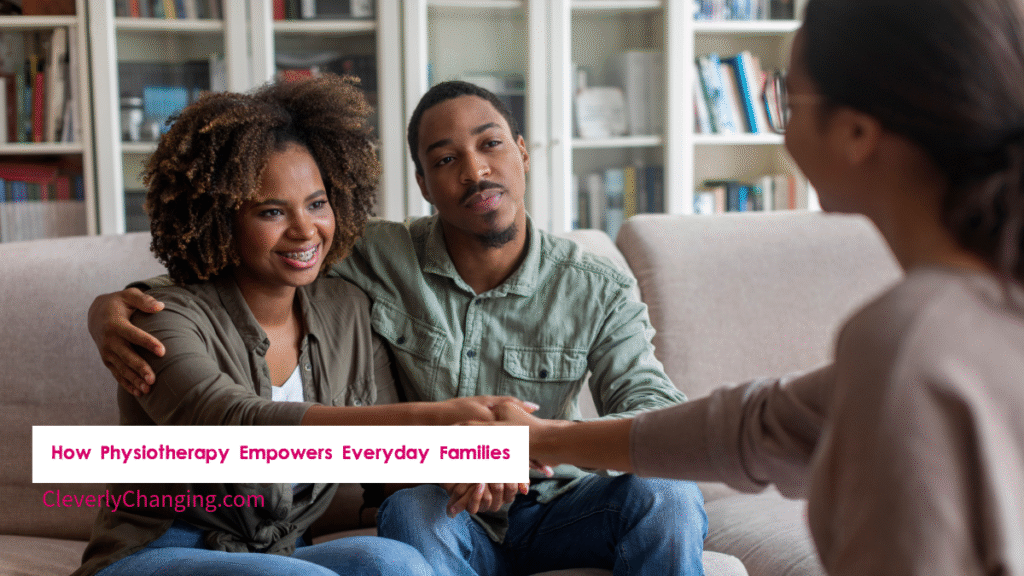Physiotherapy is often associated with sports injuries or post-surgical recovery, but its benefits reach far beyond that. For everyday families, physiotherapy can be a transformative tool for improving mobility, reducing pain, and building lifelong habits that promote wellbeing. Whether it’s helping children develop better movement patterns, supporting parents recovering from physical strain, or empowering older relatives to stay active, physiotherapy offers a holistic approach to family health.
Here are some of the key ways how physiotherapy empowers families to move, live, and thrive together.
1. Supporting Parents Through Everyday Strains
Between lifting children, long hours at work, and household responsibilities, parents often experience neck, back, and shoulder pain. Physiotherapy helps identify the root cause of discomfort (whether it’s posture, repetitive strain, or muscle imbalance) and provides tailored exercises to restore strength and flexibility.
A qualified physiotherapist in Edinburgh can design personalized programs that not only treat current pain but also teach preventive techniques to reduce future injuries. This empowers parents to move confidently through their daily routines without fear of recurring pain.
2. Helping Children Develop Healthy Movement Patterns
Children grow quickly, and with that growth come unique physical challenges. Physiotherapists can assess a child’s posture, coordination, and gait to ensure proper movement development. For children who struggle with balance, sports performance, or motor delays, physiotherapy provides fun, structured activities that enhance strength and coordination.
Early intervention can make a lasting difference, setting children up for healthier, more confident movement as they grow. It’s about nurturing resilience and encouraging active habits from a young age.
3. Supporting Recovery from Injuries
Accidents can happen to anyone in the family, from a sprained ankle on the playground to a pulled muscle during a workout. Physiotherapy focuses on restoring full function through safe, progressive rehabilitation. It helps peoplerecover faster, regain mobility, and return to their normal activities without unnecessary pain or stiffness.
Beyond physical recovery, physiotherapy also supports mental resilience. Knowing that healing is guided by evidence-based methods brings reassurance to families navigating the frustration that often accompanies injury.
4. Encouraging Active Aging for Grandparents
As we age, maintaining independence and mobility becomes increasingly important. Physiotherapy helps older adults manage chronic pain, arthritis, and balance issues, reducing the risk of falls and promoting a more active lifestyle.
Regular physiotherapy sessions can improve strength, coordination, and flexibility, which allows grandparents to keep up with grandchildren and continue enjoying their daily routines with confidence. This fosters a sense of empowerment and enhances overall quality of life.
5. Improving Posture and Reducing Screen-Related Pain
Modern life often involves long hours spent sitting or using digital devices, which can lead to posture-related tension, headaches, and musculoskeletal pain. Physiotherapists provide posture assessments, ergonomic advice, and corrective exercises designed to counteract these strains.
Families who learn proper movement and posture habits early on benefit from improved comfort and long-term spinal health. These lessons translate to better focus, fewer aches, and a greater sense of energy throughout the day.
6. Enhancing Sports Performance for the Whole Family
From weekend runners to young athletes, physiotherapy helps improve sports performance and prevent injury. By analysingbiomechanics and muscle function, physiotherapists identify weaknesses or imbalances that may limit potential.
With targeted exercises and recovery strategies, every family member can benefit from improved strength, endurance, and technique, making physical activity safer and more enjoyable for all.
7. Managing Stress Through Movement and Awareness
The mind-body connection is a central aspect of physiotherapy. Many techniques, including breathing exercises, stretching, and relaxation training, help reduce stress and improve mental clarity. By addressing both physical and emotional tension, physiotherapy supports holistic wellbeing for the entire family.
Families who incorporate physiotherapy-inspired routines into their lives often find themselves more grounded, relaxed, and connected, both physically and emotionally.
8. Building Health Awareness and Preventive Habits
One of physiotherapy’s greatest gifts is education. Families learn to understand their bodies better, like how muscles, joints, and movement patterns work together, and what to do when discomfort arises. Physiotherapists teach preventive exercises and lifestyle adjustments that help maintain balance and avoid injuries.
This awareness empowers families to take control of their health, fostering self-confidence and encouraging lifelong wellbeing practices


